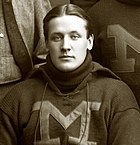1897 Michigan Wolverines football team
[1][2] The team suffered its first setback with a scoreless tie against Ohio Wesleyan in the second game of the season.
After losing the final game of the 1896 season due to the kicking of the University of Chicago's Clarence Herschberger, the Michigan football team began practice early in 1897, gathering in late August.
The team announced that, as a direct result of the 1896 loss to Chicago, a "radical change" was being made in the method of play.
"[4] Adding to the difficulties, Michigan's team captain, J.B. Wombacher, contracted typhoid fever and was unable to report to the university in September.
[6] Shortly before his illness, The World of New York had published a football preview feature in which Wombacher had been touted as the key to Michigan's success: "The man who will captain the Unlversity of Michigan eleven is a big, strapping fellow, who was forced into the game by his classmates because of his size and ability to get over the ground.
In late September 1897, Michigan end, Clayton Teetzel, fell during a practice session and "bit off half of his tongue," and was compelled "to live on milk for a week.
Left tackle Charles Juttner scored the first touchdown on a five-yard run after five minutes of play in the first half, and right halfback James Hogg kicked the goal for a 6–0 lead at halftime.
[10] On October 9, 1897, Michigan and Ohio Wesleyan played to a scoreless tie at Regents Field in Ann Arbor.
Ohio Wesleyan was led by head coach Fielding H. Yost, who also started the game at right tackle and later moved to left halfback.
On October 16, 1897, Michigan defeated Ohio State by a 34–0 score at Regents Field in Ann Arbor.
In the second half, Michigan played "for the most part a kicking game," forcing Ohio State to move the length of the field to score.
"[14] Oberlin had been favored, and when the game ended in a Michigan victory, a great celebration ensued.
Every Michigan player was raised into the air upon the shoulders of howling students and cheered till exhaustion called a halt.
[17] On November 6, 1897, Michigan defeated Purdue by a 34–4 score at Regents Field in Ann Arbor.
[19] After the game, Professor Thomas Trueblood conducted a well-attended and enjoyable performance of various character roles from Julius Caesar.
In the second half, neither team scored for 33 minutes, though Clayton Teetzel had a 65-yard touchdown run that was negated by holding penalty against Minnesota.
Then, with approximately two minutes remaining, Leo J. Keena scored a touchdown on a four-yard run, and Hogg kicked the goal to extend Michigan's lead to 14–0.
One newspaper account reported that, due to the frequency of the punts, the ball was "in the air nearly half the time.
[21] The Detroit Free Press described the celebration: "Canes were flourished; hats were thrown in air ...; pretty girls waved ribbons and flags of dual color, yellow and blue; trumpets sounded, bugles blew; horns screeched; horses neighed and pawed the ground, wondering, no doubt, what all this bother was about.
Beneath the shouts and cries, like a deep bass accompaniment to the wonderful composition of sounds ran the low muttering of the multitude and the tramping of many feet.
Michigan had won the contest and the jubilant feelings of her followers were but finding an outlet in the rhythmical yells, the lightsome sounding of tins and brasses, the short, hoarse cheers from the tired and husky throats that had already shouted all too long.
"[22] On November 20, 1897, Michigan played the team from Wittenberg College in Springfield, Ohio, prevailing by a 32–0 score at Regents Field in Ann Arbor.
Chicago's fullback, Clarence Herschberger, kicked the goal after touchdown to give the Maroons a 6 to 0 lead.
Herschberger next added a drop kick field goal from the 17-yard line to increase Chicago's lead to 11 to 0 at the end of the first half.







